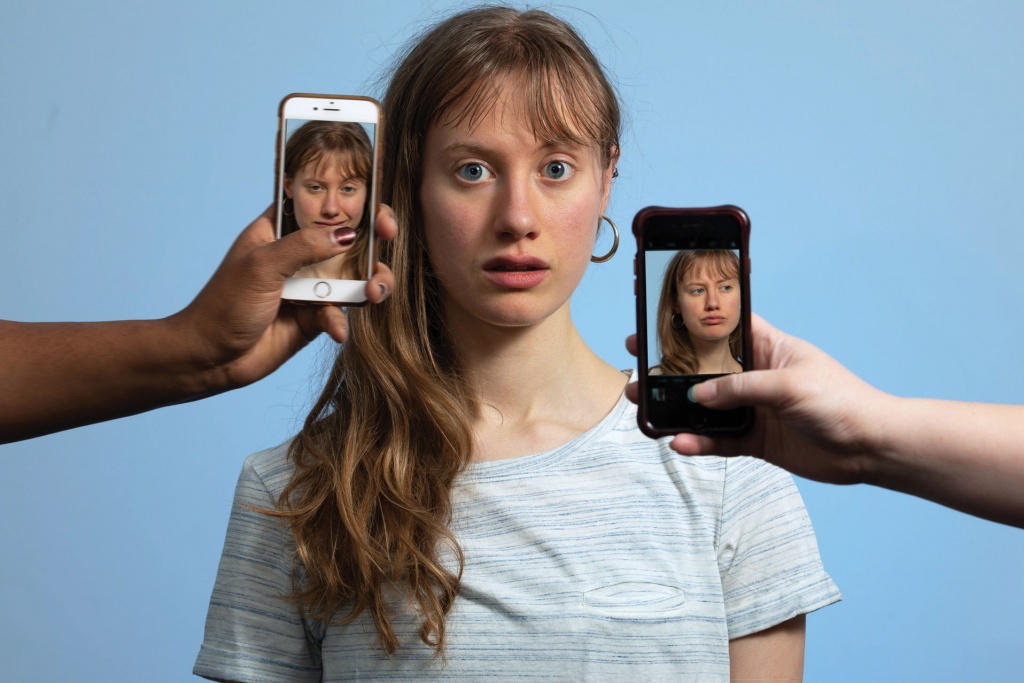Rooted in the #metoo movement, Emily Acker’s hard dramedy is a semi-nearly, barely, almost-quasi true tale based on her experience in the world of workplace sexual misconduct.
Acker was working on a television remake, “Three Up Two Down,” when her boss, Harvey Weinstein became embroiled in a sexual-assault scandal, for which he was subsequently charged.
Azuka Theatre is producing Acker’s new show, “Boycott Esther,” and out producing artistic director Kevin Glaccum spoke to PGN about his choice to bring “Boycott Esther” to the stage. Directed by Maura Krause, the show is running now through May 19 at the Drake.
PGN: How did Acker’s “Boycott Esther” fit into your vision for Azuka?
KG: “Boycott Esther” isn’t a natural fit for us in some ways. This play is much more “ripped from the headlines” than the work we normally produce. However, what it does do is focus on individual responses to outside forces. In this case: the Internet, and that is what Azuka Theatre does. I’m always drawn to the plays we produce based on my response to the characters, and with “Boycott Esther,” I could see how easily our audiences would be able to relate to all the characters Emily created.
PGN: How do you see “Boycott Esther” as a tale of an outsider?
KG: I think Esther is an outsider. She acquires a large following on social media by just being herself, which is this quirky young woman who says whatever she thinks. Only outsiders can get away with speaking their truth.
PGN: What had you known about Acker’s television remake of “Three Up Two Down” with The Weinstein Company before she came to you with Boycott Esther?
KG: I knew she’d been working on something for The Weinstein Company, a pilot for a new television show that was based on a British sitcom. I also knew she hadn’t met him; that’s pretty much all I knew.
PGN: What’s your take on the #metoo movement? It is obviously not just women, but men and members of the LGBTQ community who have been sexually harassed?
KG: The #metoo movement is extraordinary. When it first took hold on the Internet, I was stunned by how many of my friends had first-hand experience with sexual harassment, and even sexual abuse. I don’t know why I was so shocked; the numbers were out there for all to see. But that’s the power of this movement — it’s beyond numbers. It’s your friends, your mothers and your sisters being treated this way. And yes, there are examples of harassment in the LGBTQ community and elsewhere, but I guess being close to it, those responses didn’t surprise me. I’ve had slurs aimed in my direction and have been bashed, but, there was something about the overall pervasiveness #metoo exposed that made that movement powerful.
PGN: Do you see new sensitivity within members of the theater community surrounding this issue or do you feel like Philadelphia’s theater community has been respectful?
KG: Every community has room for growth in how to treat its members with sensitivity and respect. For as open and welcoming as I, a white man, feel the community can be, I know first-hand that we have a way to go until everyone who wants to make theater in Philadelphia feels at ease doing so. In other words, we have work to do.
PGN: What does the play look like onstage? How does it move? What will we see?
KG: This play is pretty tech heavy. With such a pronounced presence of social media, it really had to be. Jorge Cousineau designed the set and video elements, and they’re remarkable. We get a real sense of being immersed in Esther’s world, in how the Internet can join us with thousands of people at once, and yet keep us completely isolated.
PGN: What is our collective capacity for forgiveness — a question you ask in the tagline for “Boycott Esther”?
KG: This is the challenge of the play, and the world we live in. I like to think our collective capacity for forgiveness can be quite generous, but I’m not sure if I’m mixing forgiveness with forgetfulness. Did the world really forgive Mel Gibson or did they just forget what he said? And if they did forgive him, why him and not someone else who made a misstep? Michael Richards never came back from his racist outburst in a stand-up routine, but, now Louis C.K. is doing shows again, and his offense involved far more than a single instance. Not long ago, George W. was being called a war criminal, now he’s an avuncular old Texan painting with watercolors. I have a tendency to believe, for better or worse, that forgetfulness is more at play than forgiveness. What I think “Boycott Esther” does is to try and get us to make a decision, and not let us off the hook. n
For tickets and more information about “Boycott Esther” visit azukatheatre.org/boycott-esther.
